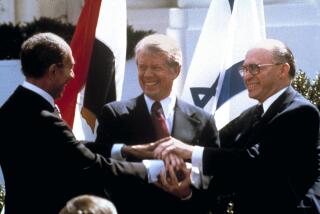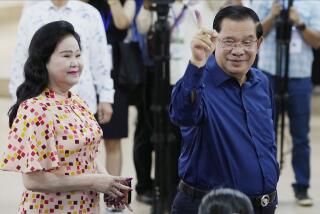CAMBODIA : Balky Khmer Rouge Has U.N. Tinkering With Peace Accord
PHNOM PENH, Cambodia — Plagued by the refusal of the hard-line Khmer Rouge to live up to last year’s Cambodia peace agreement, the United Nations is being forced to tinker with the plan to keep peace prospects alive.
Under the agreement signed in Paris, the four factions in Cambodia were supposed to have sent their soldiers to special camps, or “cantonments,” where 70% of the forces were to be disarmed under U.N. supervision. The United Nations sent 16,000 troops to Cambodia to oversee the demilitarization of the country in the period before national elections scheduled for next May.
But the Khmer Rouge’s refusal to participate in the demobilization part of the peace agreement has cast a dark cloud over the peace process. U.N. officials have glumly accepted that the Khmer Rouge will probably not rejoin the peace process and that elections will have to take place with armed soldiers in the country.
“Certainly to have free and fair elections with the armed forces of four factions more or less intact will be far more difficult than having them cantoned, disarmed and 70% demobilized,” said Yasushi Akashi, head of the U.N. peace force in Cambodia. “I’m confident we can do it, but we have to keep a sharp eye on the armies of the factions.”
The potential dangers involved became evident this week, when three U.N. election overseers--two Cambodians and a Fijian--were wounded by gunfire as they drove in a U.N. vehicle about 30 miles northwest of the provincial capital of Siem Reap. The attackers were not identified, but it was the most serious attack on U.N. personnel since they arrived in the country a year ago.
Under a proposal now before the Security Council, U.N. troops will be moved from guarding the empty cantonment sites to providing security for the elections. But even then, Khmer Rouge areas will remain off-limits to U.N. forces, so that voters in those areas will be denied a franchise.
Another major change being considered is the introduction of a presidential election before the parliamentary elections next May. The idea was originally proposed by France, with the apparent intent of anointing the mercurial Prince Norodom Sihanouk as the legal head of state.
“In a country like Cambodia, where parliamentary politics will be rather volatile, there is an awareness that you need a stabilizer to counter it,” Akashi said in an interview with The Times.
But Britain and the United States have lodged objections to the plan out of apparent concern that Sihanouk, who often ruled autocratically before he was deposed in 1970, would dominate the new Constituent Assembly. How can you elect a president, they argue, before electing the Parliament that will define the president’s powers?
There are also fears that the government in Phnom Penh, whose own popularity has plummeted in recent months, might use Sihanouk’s election as a pretext to postpone the parliamentary elections. As a counterproposal, London and Washington have suggested holding the presidential election simultaneously with the parliamentary elections.
For his part, Sihanouk has been in Beijing, reportedly sulking because the West has not rushed to support his presidency with the alacrity he desired.
The discussion of a presidential election, which was not provided for in the peace agreement, is further evidence of growing concern that the Khmer Rouge will renew the civil war in the months immediately after the elections.
Already, there are signs that an offensive is imminent, with both the Khmer Rouge--flush with money from a thriving border trade with Thailand--and the Phnom Penh government moving ammunition toward the front lines. Traditionally, a dry-season military offensive has opened in January, and experts here say there is every sign that this coming year will be no different.
Another cause of concern for the government is a series of attacks against political parties, reported in virtually every part of the country. In one day, 11 members of Sihanouk’s party were wounded by grenades thrown into party offices, and a member of the Buddhist Liberal Party was gunned down in front of his wife and children.
More to Read
Sign up for Essential California
The most important California stories and recommendations in your inbox every morning.
You may occasionally receive promotional content from the Los Angeles Times.










